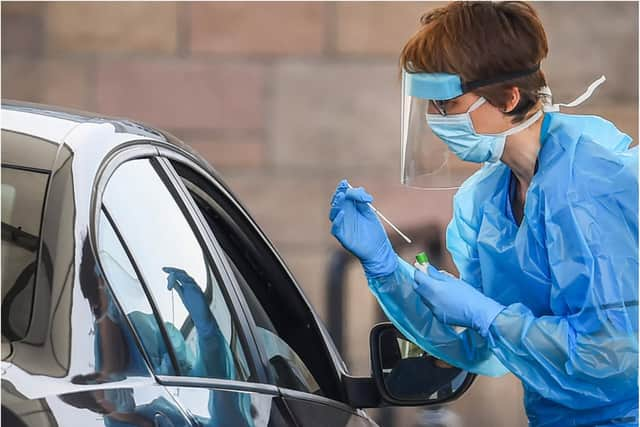UK has reduced the coronavirus alert level
The four top medics advising the UK, Scottish, Welsh and Northern Irish governments agreed that the reducing transmission of the disease meant that the five-step alert level could be lowered from four to three.
It means that Covid-19 is “in general circulation” with the risk of localised outbreaks. At level three, the assessment means that restrictions can be gradually reduced.


Advertisement
Hide AdAdvertisement
Hide AdGovernments across the UK have already been announcing further easing of restrictions this week, with non-essential retail reopening in England, households allowed to form ‘support bubbles’ in Scotland and England under certain conditions, and the tourism industry in Wales being told it can reopen from 6 July.
People who are shielding for medical reasons in Scotland were told yesterday that they can now go outside for the first time, while observing social distancing.
Hospitality and tourism businesses in Scotland have been told they may be able to reopen from 15 July. However, there was disappointment at the announcement from Nicola Sturgeon that bars and restaurants with outdoor space must remain closed for the time being.
The move had been expected as part of phase 2 of the Scottish Government’s lockdown roadmap, which broadly corresponds to alert level three.
The alert level, which is officially set by the UK Government’s Joint Biosecurity Centre but in practice is determined by the four chief medical officers, is determined by the R level of virus transmission, in combination with the total number of confirmed coronavirus cases at any one time.
At level four, the alert level stated that “transmission is high or rising exponentially”. The number of confirmed cases has remained stable for roughly a week, with rolling 7 day average of daily new cases currently at 1307 for the UK, and 21 for Scotland.
In a joint statement, the four chief medical officers said: “The Joint Biosecurity Centre has recommended that the Covid-19 alert level should move from Level 4 (Covid-19 is in general circulation; transmission is high or rising exponentially) to Level 3 (Covid-19 is in general circulation).
"The CMOs for England, Scotland, Wales and Northern Ireland have reviewed the evidence and agree with this recommendation to move to Level 3 across the UK.
Advertisement
Hide AdAdvertisement
Hide Ad“There has been a steady decrease in cases we have seen in all four nations, and this continues. It does not mean that the pandemic is over. The virus is still in general circulation, and localised outbreaks are likely to occur.
“We have made progress against the virus thanks to the efforts of the public and we need the public to continue to follow the guidelines carefully to ensure this progress continues.”
The four CMOs are:
England: Professor Chris Whitty;
Northern Ireland: Dr Michael McBride;
Scotland: Dr Gregor Smith;
Wales: Dr Chris Jones.
A message from the Editor:
Thank you for reading this story on our website. While I have your attention, I also have an important request to make of you.
With the coronavirus lockdown having a major impact on many of our advertisers - and consequently the revenue we receive - we are more reliant than ever on you taking out a digital subscription.
Subscribe to scotsman.com and enjoy unlimited access to Scottish news and information online and on our app. With a digital subscription, you can read more than 5 articles, see fewer ads, enjoy faster load times, and get access to exclusive newsletters and content. Visit https://www.scotsman.com/subscriptions now to sign up.
Our journalism costs money and we rely on advertising, print and digital revenues to help to support them. By supporting us, we are able to support you in providing trusted, fact-checked content for this website.
Comments
Want to join the conversation? Please or to comment on this article.